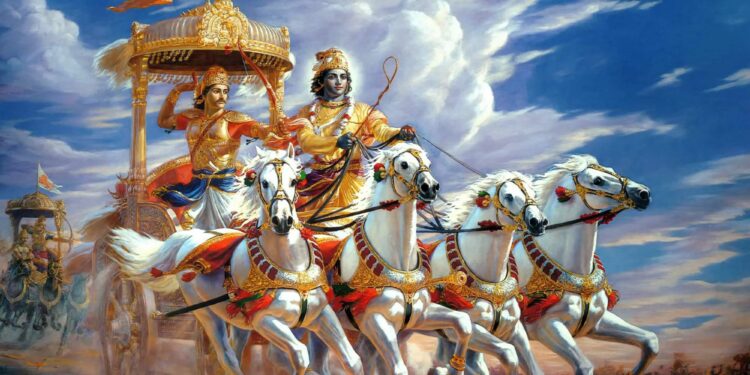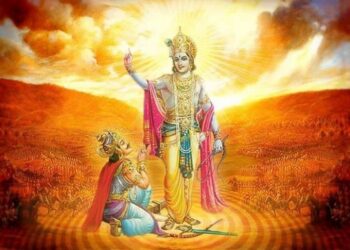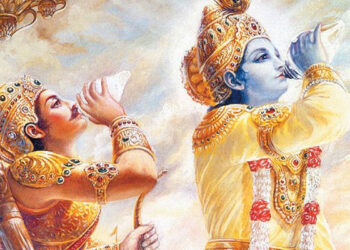TEXT 71
vihāya kāmān yaḥ sarvān
pumāṁś carati niḥspṛhaḥ
nirmamo nirahaṅkāraḥ
sa śāntim adhigacchati
SYNONYMS
vihāya—giving up; kāmān—material desires for sense gratification; yaḥ—who; sarvān—all; pumān—a person; carati—lives; niḥspṛhaḥ—desireless; nirmamaḥ—without a sense of proprietorship; nirahaṅkāraḥ—without false ego; saḥ—he; śāntim—perfect peace; adhigacchati—attains.
TRANSLATION
A person who has given up all desires for sense gratification, who lives free from desires, who has given up all sense of proprietorship and is devoid of false ego—he alone can attain real peace.
PURPORT
To become desireless means not to desire anything for sense gratification. In other words, desire for becoming Kṛṣṇa conscious is actually desirelessness. To understand one’s actual position as the eternal servitor of Kṛṣṇa, without falsely claiming this material body to be oneself and without falsely claiming proprietorship over anything in the world, is the perfect stage of Kṛṣṇa consciousness. One who is situated in this perfect stage knows that because Kṛṣṇa is the proprietor of everything, everything must be used for the satisfaction of Kṛṣṇa. Arjuna did not want to fight for his own sense satisfaction, but when he became fully Kṛṣṇa conscious he fought because Kṛṣṇa wanted him to fight. For himself there was no desire to fight, but for Kṛṣṇa the same Arjuna fought to his best ability. Real desirelessness is desire for the satisfaction of Kṛṣṇa, not an artificial attempt to abolish desires. The living entity cannot be desireless or senseless, but he does have to change the quality of the desires. A materially desireless person certainly knows that everything belongs to Kṛṣṇa (īśāvāsyam idaṁ sarvam [Īśo mantra 1]), and therefore he does not falsely claim proprietorship over anything. This transcendental knowledge is based on self-realization-namely, knowing perfectly well that every living entity is an eternal part and parcel of Kṛṣṇa in spiritual identity, and that the eternal position of the living entity is therefore never on the level of Kṛṣṇa or greater than Him. This understanding of Kṛṣṇa consciousness is the basic principle of real peace.
TEXT 72
eṣā brāhmī sthitiḥ pārtha
naināṁ prāpya vimuhyati
sthitvāsyām anta-kāle ‘pi
brahma-nirvāṇam ṛcchati
SYNONYMS
eṣā—this; brāhmī—spiritual; sthitiḥ—situation; pārtha—O son of Pṛthā; na—never; enām—this; prāpya—achieving; vimuhyati—one is bewildered; sthitvā—being situated; asyām—in this; anta-kāle—at the end of life; api—also; brahma-nirvāṇam—the spiritual kingdom of God; ṛcchati—one attains.
TRANSLATION
That is the way of the spiritual and godly life, after attaining which a man is not bewildered. If one is thus situated even at the hour of death, one can enter into the kingdom of God.
PURPORT
One can attain Kṛṣṇa consciousness or divine life at once, within a second—or one may not attain such a state of life even after millions of births. It is only a matter of understanding and accepting the fact. Khaṭvāṅga Mahārāja attained this state of life just a few minutes before his death, by surrendering unto Kṛṣṇa. Nirvāṇa means ending the process of materialistic life. According to Buddhist philosophy, there is only void after the completion of this material life, but Bhagavad-gītā teaches differently. Actual life begins after the completion of this material life. For the gross materialist it is sufficient to know that one has to end this materialistic way of life, but for persons who are spiritually advanced, there is another life after this materialistic life. Before ending this life, if one fortunately becomes Kṛṣṇa conscious, he at once attains the stage of brahma-nirvāṇa. There is no difference between the kingdom of God and the devotional service of the Lord. Since both of them are on the absolute plane, to be engaged in the transcendental loving service of the Lord is to have attained the spiritual kingdom. In the material world there are activities of sense gratification, whereas in the spiritual world there are activities of Kṛṣṇa consciousness. Attainment of Kṛṣṇa consciousness even during this life is immediate attainment of Brahman, and one who is situated in Kṛṣṇa consciousness has certainly already entered into the kingdom of God.
Brahman is just the opposite of matter. Therefore brāhmī sthiti means “not on the platform of material activities.” Devotional service of the Lord is accepted in the Bhagavad-gītā as the liberated stage (sa guṇān samatītyaitān brahma-bhūyāya kalpate). Therefore, brāhmī sthiti is liberation from material bondage.
Śrīla Bhaktivinoda Ṭhākura has summarized this Second Chapter of the Bhagavad-gītā as being the contents for the whole text. In the Bhagavad-gītā, the subject matters are karma-yoga, jñāna-yoga, and bhakti-yoga. In the Second Chapter karma-yoga and jñāna-yoga have been clearly discussed, and a glimpse of bhakti-yoga has also been given, as the contents for the complete text.
Thus end the Bhaktivedanta Purports to the Second Chapter of the Śrīmad Bhagavad-gītā in the matter of its Contents.


















